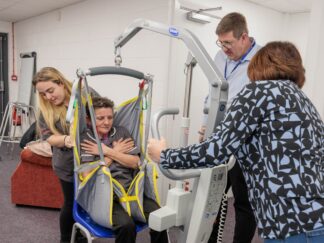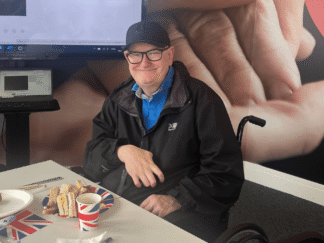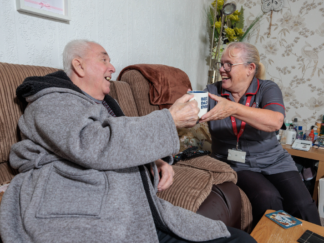
At Homecarers Care Services our mission is ‘to deliver exceptional and personalised care to our service users; enhancing their quality of life, independence, and dignity.’ With this we have the responsibility of ensuring our service users are cared for, respected and safe. This also applies to all our hard-working staff.
While boundaries to some might sound like restrictions and limitations, they ensure that our staff and service users can foster healthy and respectful relationships.
What Are Boundaries in Caregiving?
Home care is a deeply personal and often emotionally charged experience. Whether you’re a professional carer or a loved one providing support, the relationship between a carer and the one they care for thrives on trust, respect, and clear boundaries.
Boundaries in care can come in a range of forms including emotional, physical and professional. All of these are part of how our care workers interact with our service users.
Examples of boundaries in care include:
Time Boundaries
Carers: It’s important to have an appropriate work-life balance with enough time to rest and take time for yourself away from your caregiving.
Service Users: Having set times that promote a continuous routine can have a positive effect on the service user’s mental well-being.
Physical Boundaries
Carers: Should feel safe and respected and shouldn’t be expected to perform tasks beyond their training or comfort.
Service Users: Physical boundaries can range from the carers asking before entering rooms, to maintaining modesty during personal care.
Emotional Boundaries
Professional Care Workers: While providing emotional support, it’s important to not absorb the burden of your service user’s struggles.
Family Care Givers: We understand it’s difficult watching a loved one struggle, however you should not feel guilty. Caring for a loved one is an incredible way to support them and you can only do the best you can. If you are struggling it is important to reach out for help. Whether it’s emotional, physical or financially, visit Carers Trust for support.
Role Boundaries
Professional Care Workers: While supporting your service users, you should not be expected to perform duties outside of your role.
Family Care Givers: For those caring for your loved ones, it’s also important to recognise that you’re allowed to say no. If you are feeling overwhelmed or stressed, it’s important to take a break. At MerseyCare Julie Ann, we offer services such as Respite Care, for those family caregivers who need support. Please remember that there is no shame for asking for help.
Communication Boundaries
Both carers and service users should be respectful to each other. This means there should be no passive aggressive behaviour. On top of this confidentiality should be maintained and information shouldn’t be shared unless appropriate.
Personal and Cultural Beliefs
Both should be respectful of the other person’s individual beliefs, values and preferences. Whether this be regarding their dietary preferences, religion or routine choices.
Our Core Principles
Our company values help represent not only how we treat our service users and staff, but how we ensure that boundaries are put in place.
Respect
Respecting our service user’s decisions, making sure they are involved in every part of the process, starting with the care plans and ensuring their preferences are listened to while making sure their privacy and dignity are respected.
For our staff we ensure they are protected from emotional exhaustion and burnout, offering support through our mental health first aiders and employee assistance programme, TELUS Health. By respecting our staff boundaries, we can ensure they are empowered to provide the highest standard of care.
Transparency
We feel that transparency is important, especially when explaining our limitations. Through transparency with our service users, we can try to meet their needs to be best of our abilities while being realistic. For example, while scheduling care calls and allocating carers may sound simple, we cannot always provide the same times if carers are unexpectedly off sick. By being transparent and communicating these issues prior we can communicate to our service users that we will do our best to ensure their needs are met and avoid future misunderstandings.
Empower
We empower our service users to live more independently and giving them the ability to make informed choices about their care. We offer a range of support services available exclusively to our staff to ensure they are well and trained to provide the highest standard of care.
Safety
Our care training consists of online training, 4 days of in person training, followed by shadowing with an experienced carer. Our training consists of manual handling, medication and hygiene practices, all of which ensure the health and safety of both our staff and service users.
Efficiency
Boundaries within our work environment can be defined as our ‘roles and responsibilities’. With these set-in place, we can ensure a well structed layout, ensuring clear communication between office, care staff and service users, better time management and ensuring a smooth service.
Environment
Being a domiciliary care company, our care staff are working in our service users own home. Respecting their home and environment is a high priority.
Why Do Boundaries in Caregiving Matter?
Well-being
Our purpose is to protect the health and well-being for not only our service users, but our staff also. Caregiving is an incredibly rewarding career that improves the well-being of our service users but can take its toll. Burnout is often common while caregiving after a long period of time. We understand the importance of preventing it and looking after your own health and therefore have boundaries and support systems put in place for our staff, we can ensure our carers are also cared for.
Respect and Listening
It’s important that our service users are listened to when receiving their care. For example, when providing personal care, by ensuring our service users are listened to, they can feel comfortable around our staff and know they’re being treated with dignity.
Boundaries Are Not Barriers
We want our staff and service users to build connections and be comfortable with each other. To do this we need to ensure that these relationships are professionally grounded and not overly familiar. With boundaries put in place we can ensure the safety, health and happiness of all involved. With these we can protect relationships, ensure clearer communication and in turn have more effective care. To us at Homecarers Care Services, these boundaries are an act of care.
Further Information
Social Media
To keep up to date with what we get up to, please visit our socials by clicking the links below.
Liverpool
Cheshire
Our partners




























